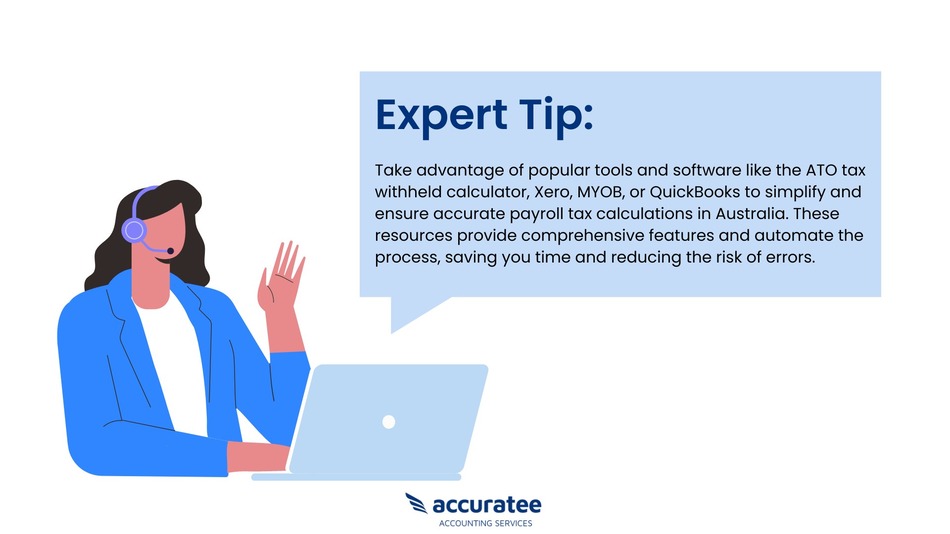Understanding payroll tax rates calculation methods in Australia
Introduction:
Are payroll tax rates causing you confusion or concern? Don't worry! In this blog, we will provide clarity on payroll tax rates calculation methods in Australia, empowering you with the knowledge you need to stay compliant and avoid any unexpected surprises.
As a premier outsourcing accounting and bookkeeping service provider, we at CleanSlate, specialise in helping businesses just like yours navigate the complex world of finances. Read on to know the ins and outs of payroll tax rates in a way that's easy to understand.
Key takeaways
Strategically plan employee remuneration packages to minimise the payroll tax impact.
Utilize available exemptions and deductions to optimise payroll tax liability.
Maintain accurate records for easier reporting and compliance.
Seek professional advice for expert guidance on managing your payroll tax obligations.
What is payroll tax?
Payroll tax in Australia is a state-based tax imposed on employers who pay wages to their employees. It is designed to fund various state government services and infrastructure projects. Each state and territory in Australia has its own payroll tax legislation and rates, although they share some common features.
Employers are generally required to pay payroll tax when their total Australian taxable wages exceed the relevant threshold set by the state or territory. The taxable wages include salary, wages, bonuses, allowances, and some fringe benefits provided to employees. However, certain exemptions and deductions may apply depending on the specific circumstances and state regulations.
Payroll tax rates typically vary between states and are calculated as a percentage of the total taxable wages. The rates may also differ based on the size of the business and the industry in which it operates. Employers need to understand their obligations and ensure timely compliance with payroll tax requirements to avoid penalties or legal issues.
Why is it important to understand payroll tax rate calculation?
Understanding payroll tax rates calculation is essential for several reasons:
-
Compliance:
A thorough understanding of payroll tax rates calculation ensures businesses comply with tax laws and regulations. By accurately determining their liability and meeting obligations in a timely manner, businesses can avoid penalties and legal consequences. It also allows businesses to monitor wage levels and identify opportunities for exemption eligibility, optimising their payroll tax liability.
-
Cost management:
Payroll tax represents an additional cost for businesses. Understanding how rates are calculated helps in budgeting and cash flow management. The accurate calculation allows businesses to allocate funds appropriately and plan for this expense.
-
Financial planning:
Knowledge of payroll tax rate calculation supports effective financial planning. Business owners can assess the impact on overall expenses, enabling them to make informed decisions regarding hiring, wages paid, and other financial aspects that affect their payroll tax liability.
-
Reporting accuracy:
Accurate calculation ensures business reports payroll liabilities correctly. Understanding the calculation methods helps generate precise reports, contributing to transparent and accurate financial reporting.
What are the key components involved in calculating payroll tax rates?
When calculating payroll tax rates Australia, several key components come into play. Let's take a closer look at these calculation factors:
-
Taxable wages:
Taxable wages refer to the total amount of remuneration paid to employees, including salaries, wages, bonuses, allowances, medicare levy, and certain fringe benefits. It's important to identify which payments are subject to payroll tax and include them in your calculations.
-
Thresholds:
Each state sets a specific threshold, which is the amount of taxable wages at or above which employers become liable to pay tax. It's essential to know the threshold applicable to your location, as it determines whether you are required to pay payroll tax.
-
Exemptions and deductions:
Various exemptions and deductions may apply to reduce your payroll tax liability. These can include exemptions for certain industries, specific types of payments, or allowances for employers with annual taxable wages below a certain threshold. Being aware of the exemptions and deductions relevant to your circumstances can help optimise your payroll tax liability.
Examples to help understand how payroll tax rates are calculated
-
Example 1: Calculation of payroll tax rates
Consider a business operating in New South Wales with taxable wages of $900,000 for a financial year.
To calculate the payroll tax liability:
Determine if the business exceeds the threshold: $900,000 < $1,200,000 (threshold) - No payroll tax liability.
Since the taxable wages are below the threshold, the business is not required to pay payroll tax in this example.
-
Example 2: Calculation of payroll tax rates with threshold exceeded
Now, let's consider the same business with taxable wages of $1.5 million, exceeding the New South Wales threshold.
To calculate the payroll taxes:
Determine if the business exceeds the threshold: $1,500,000 > $1,200,000 (threshold) - Payroll tax liability is applicable.
Calculate the excess taxable wages: $1,500,000 - $1,200,000 = $300,000.
Apply the payroll tax rate: $300,000 x 5.45% = $16,350.
The business would be liable to pay $16,350 in payroll tax for the financial year.
When to register for payroll tax?
The timing for registering for payroll taxes varies depending on the state or territory in Australia. Generally, businesses are required to register for payroll tax when their total taxable wages reach or exceed the threshold set by the respective state.
It is important to note that the threshold and registration requirements may differ between jurisdictions. In some states, such as New South Wales and Victoria, registration is mandatory once the threshold is met. In other states, such as Queensland and Western Australia, businesses have a choice to voluntarily register even if they haven't reached the threshold.
To determine when to register for payroll tax, businesses should closely monitor their taxable wages paid and stay updated with their state's specific rules and regulations. It is advisable to proactively assess whether your business is approaching or has already exceeded the threshold, and take the necessary steps to register accordingly.
Failing to register for payroll tax when required can result in penalties and interest charges. Therefore, it is crucial to be aware of the registration requirements and ensure timely compliance with the rules set by the relevant state or territory revenue office.
Consulting with a professional accountant or contacting the state revenue office directly can provide further guidance on the specific registration obligations in your jurisdiction.
How to check if you have to register?
To determine if you need to register for payroll tax, you can follow these steps:
- Understand the threshold your state or territory sets for payroll tax registration.
- Calculate your total taxable wages, and ensure you are including all applicable payments.
- Visit the website of your state revenue office to look for specific information and guidelines regarding payroll tax registration.
- Some state revenue offices provide online calculators or tools to help businesses determine their liability and registration obligations.
- If you are uncertain or have complex circumstances, consider consulting with a professional accounting firm like CleanSlate or contacting the state revenue office directly.
Payroll tax rates and thresholds
| State/Territory | Tax threshold | Payroll tax rate |
|---|---|---|
| New South Wales | $1,200,000 | 5.45% |
| Victoria | $700,000 | 4.85% or 1.2125% for regional employers |
| Australian Capital Territory | $2,000,000 | 6.85% |
| Queensland | $1,300,000 | 4.75% - 4.95% |
| Tasmania | $1,250,000 - $2,000,000 | 4% - 6.1% |
| Northern Territory | $1,500,000 | 5.5% |
| South Australia | $1,500,000 | 4.95% |
| Western Australia | $1,000,000 | 5.5% - 6.5% |
How can CleanSlate help you with payroll tax payments?
CleanSlate, as a leading outsourcing accounting and bookkeeping firm, can provide valuable assistance and expertise when it comes to payroll tax payments, such as:
-
Calculation and compliance:
We have a deep understanding of payroll tax regulations and calculation methods across different states and territories in Australia. Our expert professionals can accurately calculate your liability based on your total wages, thresholds, rates, and applicable exemptions. This ensures compliance with the specific requirements of your state.
-
Timely reporting:
Our firm can handle the timely reporting of your payroll tax obligations. We can prepare and submit payroll tax returns on your behalf, ensuring that all necessary information is accurately reported to the relevant state or territory revenue office. This helps you avoid any penalties or issues arising from late or incorrect reporting.
-
Exemption and deduction optimization:
Our team can identify and maximise the available exemptions and deductions specific to your business. By understanding your industry, workforce, and unique circumstances, we can explore opportunities to reduce your liability within the boundaries of the law.
-
Professional guidance:
Our experienced accountants and bookkeepers are readily available to provide expert advice and guidance on all aspects of payroll tax. We can address your specific concerns, answer your questions, and offer strategic recommendations to manage your payroll tax payments effectively.
By partnering with CleanSlate for your payroll needs, you can focus on running your business while leaving the complexities of payroll tax calculations, reporting, and compliance to our dedicated team.
Turn Your Bookkeeping into a Breeze!
Tips and strategies to help businesses effectively manage their payroll tax obligations.
-
Tax planning:
Strategically plan employee remuneration packages to minimise the payroll tax impact.
-
Exemptions and deductions:
Utilize available exemptions and deductions to optimise payroll tax liability.
-
Efficient record-keeping:
Maintain accurate payroll records for easier reporting and compliance.
-
Payroll tax software:
Invest in reliable software for automated calculations and accurate reporting.
-
Regular compliance reviews:
Conduct periodic reviews to identify and address compliance issues.
-
Stay informed:
Stay updated on payroll tax legislation changes and adjust strategies accordingly.

To access up-to-date information, consider visiting the following government websites
Australian Taxation Office (ATO): www.ato.gov.au
State revenue offices:
New South Wales: www.revenue.nsw.gov.au
Victoria: www.sro.vic.gov.au
Queensland: www.treasury.qld.gov.au
Western Australia: www.wa.gov.au
South Australia: www.revenuesa.sa.gov.au
Tasmania: www.sro.tas.gov.au
Northern Territory: www.treasury.nt.gov.au
Australian Capital Territory: www.revenue.act.gov.au
Remember to regularly check these sources for updates, subscribe to newsletters, and seek professional advice to ensure you are well-informed about payroll tax rates and legislation in Australia.
Wrapping up
Stay updated on payroll tax rates and legislation to ensure your small business meets its obligations. Refer to reliable resources like government websites such as the ATO and State Revenue Offices for accurate information.
Do not navigate the complexities alone - consult with professional advisors for expert guidance. CleanSlate is your trusted partner for accounting and bookkeeping services.
Contact us today and let us assist you in managing your payroll tax effectively. Together, we will ensure your business stays on the right track while optimising your financial operations.









